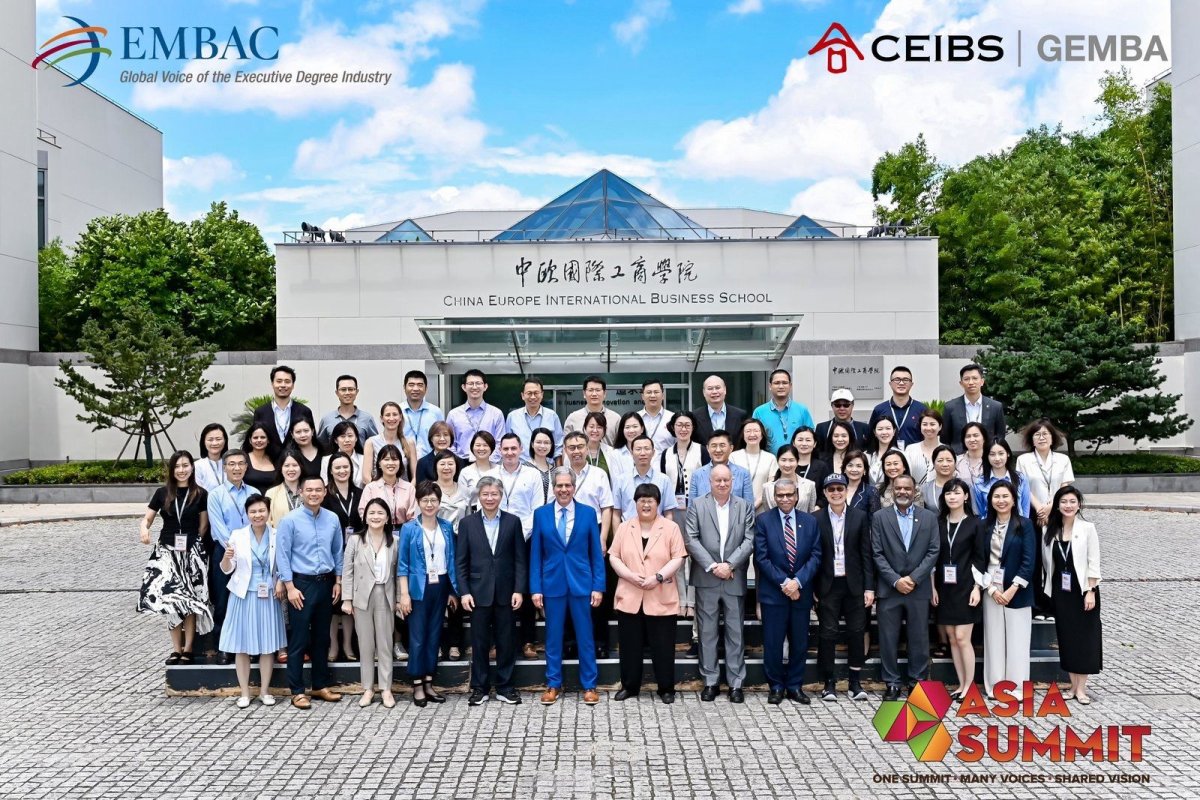CEIBS hosts EMBAC Asia Summit to chart future of executive degree education
July 10, 2025. Shanghai – As the global higher education landscape continues to evolve, the EMBAC Asia Summit 2025, a significant gathering of the world’s foremost leaders in business education, was held at CEIBS Shanghai campus from July 9-10.
Organised by the Executive MBA Council (EMBAC), the summit convened a diverse group of academics, business leaders, senior executives and industry figures to examine critical challenges and emerging opportunities at the forefront of management education, and explore the innovative practices shaping its future.
During her welcome address, CEIBS President Wang Hong stated that current changes in the global business landscape are profoundly reshaping corporate expectations of leadership talent, necessitating accelerated transformation of executive degree education. She pointed out that CEIBS has been a proactive innovator in management education, and is committed to navigating these challenges through three strategic pathways: Translation of frontier scholarship into practical application; Global dissemination of distinctive Chinese insights in management; and Leveraging digital technology to enhance institutions’ pedagogical capabilities.
Highlighting CEIBS' current development of its next five-year strategic plan, President Wang emphasised that guided by the principle of “Internationalisation, Innovation, and Impact”, the school will continue to step up effort in eight strategic initiatives: Reinforce CEIBS’ top-tier position; Exemplify CSR education; Expand CEIBS’ world-class faculty; Create signature research areas; Diversify CEIBS’ programme portfolio; Bridge China and Europe; Accelerate AI application; and Empower CEIBS alumni.
CEIBS is committed to becoming both the definitive “China expert” within the global management education community and the definitive “global expert” supporting Chinese enterprises in their internationalisation efforts, she added.
"Internationalisation is fundamental to CEIBS' identity. We remain committed to our role as a bridge fostering collaboration in global business education. Looking ahead, CEIBS stands ready to work with partners worldwide to build a shared knowledge community, cultivate the next generation of innovative talent, and collectively shoulder the defining responsibilities of our era,” President Wang concluded.
In a keynote speech entitled “Global View of Executive Degree Educations: What Does the Data Say?”, EMBAC Executive Director Michael Desiderio emphasised that the summit aimed to deepen community connections and deliver unique value to the global business education through collective expertise.
He pointed out that business school students today seek more than traditional knowledge. Instead, they increasingly expect business schools to serve as a powerful catalyst for profound personal transformation and becoming a “better self”. This focus on personal growth, he argued, is reshaping the core value proposition of business education.
Turning to preferred learning formats, Mr. Desiderio noted that while face-to-face teaching is still a primary instruction method, hybrid teaching is now the second most offered, showing schools are moving to meet the changing market needs.
"Robust data illuminates the path forward. Platforms like the Asia Summit are crucial for stakeholders to crystallise actionable insights for the future of business schools through candid dialogue and shared experience," he said.
Following this, CEIBS President (European) Dominique Turpin delivered a keynote speech entitled “Trends impacting Asia and Beyond” during which he outlined four key macro trends currently shaping global business education.
First, a rebound in global applications driven by growth in demand for domestic and specialised programmes. Second, shifting student mobility patterns: geopolitical factors, cost, and policy are increasingly critical in influencing student choices of study destinations. Third, the decline in interest in the US as a study destination among Chinese candidates, with China remaining, along with India, a top global source of international students. Fourth, evolving skill priorities: cultivating a global mindset is no longer a top priority for employers, as proficiency in AI and strategic thinking rise sharply as desired future skills.
In response to rising challenges in global business education, Prof. Turpin highlighted CEIBS’ proactive steps, including the launch of Global Master in Management progrmme (MiM), increased investment in international marketing and communications, and deepened partnerships with other leading global business schools.
He also emphasised Asia’s growing importance as a destination for international students. “Asia will remain attractive for global learners. China is too big to be ignored. Second, China’s competitiveness and innovation models all over Asia are another reason for students to come to understand new business model and new activity. Third, there's a growing need for Asian companies to diversify geographically and go global, with a global mindset,” Prof. Turpin said, calling for the global education community to engage with China to witness its dynamic innovation across industries.
To ensure the continued advancement of business education, Prof. Turpin called for business schools to adapt strategically, build strong regional influence, adhere to international standards, and pursue innovation in pedagogy and collaborative models.
Following this, Lu Xiongwen, Dean of the School of Management at Fudan University, delivered a keynote speech titled “The Chinese View of the MBA/EMBA Education Market” during which he reviewed the history and current landscape of business education in China, noting that today, over 90% of Chinese universities have established management or business schools, totaling nearly 800 institutions.
He emphasised that the sustained growth of China’s economy, the surging momentum of Chinese innovation, and the rapid development of a new generation of young faculty in China have together created a formidable force in management education. These factors, intertwined with vast market demand and a rich supply of high-quality educational resources, have opened up vast potential for the development of EMBA and MBA programmes in China.
Prof. Lu advocated for systemic reform, urging a move away from outdated models that focus solely on research papers towards new evaluation standards that are closely aligned with real-world challenges. "The core of business school education," he asserted, "must integrate industry practice with a mission to serve society." He further called for more flexible educational strategies to invigorate a new ecosystem for management education.
This was followed by the first panel discussion of the day moderated by CEIBS Professor of Economics, Associate Dean, and Director of GEMBA Programme Bala Ramasamy. Based on the topic “How are China’s Leading Employers Shifting their Expectations for Working Professional Degrees?”, the panellists were Vice President of Human Resources and Corporate Communications of Moët Hennessy Louis Vuitton (China) Cai Yingling, Head of People & Culture for Asia Pacific of Siemens Healthineers Li Jingqi, General Manager of New Business Development of Talent Solutions at LinkedIn Zhang Fei, and Senior Global Operations Director of Trip.com Group Wang Si discussed evolving corporate demands for executive degrees. Collectively, they argued that as Chinese companies expand globally, employers increasingly seek bold, unconventional talent, calling for business schools to offer specialised programmes tailored toward industry needs and the breaking down of disciplinary barriers.
In a speech titled “Branding for the Future: Navigating Consumer Polarisation, Redefining Strategy”, CEIBS Professor of Marketing, Associate Dean (Research), and Research Area Director of ESG Wang Yajin noted that the trend of consumer polarisation has become a global phenomenon. Using well-known brands such as MINISO and VIVO as examples, she pointed out that the high-end and low-end market segments are expanding rapidly, while the middle market is increasingly being squeezed out.
In the high-end market, Prof. Wang emphasised that brands must centre themselves around their customers, develop a deep understanding of consumer needs, and win market share by delivering unique value proposition and exceptional experiences. In the low-end segment, on the other hand, success hinges on delivering extreme price performance, fostering differentiation, and building barriers to entry to avoid homogenised competition and secure growth opportunities.
Technological advances, she noted, have driven customer channel-switching costs towards near zero. Brands must therefore integrate multiple scenarios to trigger consumption and shift from one-way communication to interactive co-creation.
"This necessitates a fundamental paradigm shift from B2B to truly customer-centric (C2B) business logic," Prof. Wang said. "Depth of consumer understanding, quality of engagement, and resilience of long-term relationships will distinguish brands capable of sustainable, cyclical growth," she concluded.
The following panel, moderated by Managing Editor of WhichMBA.net Zhao Ying, explored the disruptive power of Key Opinion Leaders (KOLs) and Key Opinion Consumers (KOCs). Featuring Ji Weijia, Chief Digital Officer of Ogilvy China, Zhao Linghui, author and digital marketing strategy expert, and Zhao Yi, CEO of Yingxiang Network Technology and ex-founding member of Rednote, the discussion highlighted unique Chinese digital marketing practices. Panellists emphasised that content creation must relate directly to its audience, build a compelling persona, and share genuine experiences. Only in this way can brands stand out amid a rising tide of competition in digital marketing.
On the second day of the summit, CEIBS President Emeritus and Distinguished Professor of Marketing Dipak Jain then delivered a keynote on "The Future Insights for Executive Education". Drawing on his extensive experience, Prof. Jain pointed out that the development of MBA programmes reflects a broader evolution in educational philosophy. In their early days, programmes emphasised business relevance, using case studies based on real-world examples to foster practical insight. Later, focus shifted toward academic excellence, with analytical models and rigorous reasoning strengthening theoretical depth. Entering the 21st century, a growing emphasis on social impact has become the prevailing trend, prompting business schools to integrate business ethics and ESG (environmental, social, and governance) principles into experiential learning, with the aim of cultivating well-rounded future business leaders.
Prof. Jain observed that in executive degree education, interaction between students and faculty not only expands the boundaries of knowledge but also fuels the development of innovative thinking.
Looking ahead, he emphasised that business education must focus on nurturing students’ capacity for innovation, cross-cultural communication skills, and ability to lead sustainably to meet the challenges of the era.
Following this, a third panel discussion was moderated by the Director of National University of Singapore (NUS) MBA Programme Nicole Tee, featuring Associate Dean of the Guanghua School of Management at Peking University Ma Li, Assistant Dean of Shanghai Advanced Institute of Finance Ni Haiying, Head of Executive Education Department of Fudan School of Management Paul Shao, and Associate Director of CKGSB MBA Department Zhang Weichao on the topic of “Rapid External Market Changes and Impact on Programme Design”. Drawing on their institutions’ experiences and market research data, they shared innovative practices in curriculum design aimed at addressing external market shifts.
Focusing on the “AI and the Impact of Technology on Education”, the fourth panel featured President of Zhaopin.com and Co-founder of VIPKID Zhang Yuejia, Chief Strategy Officer of Tezign and Vice Chair of the AI and Business Innovation Research Fund Ren Yuan, Founder of Global EduMind AI and former technology expert at Oracle and Microsoft Zhang Ying, and Founder of Meipian and former senior executive at Huawei Tang Qi. Moderated by Head of Marketing and Admissions for Chinese EMBA Programme at NUS Xiang Jing, the discussion featured insights into the opportunities and challenges AI presents for the education sector based on their diverse experiences applying AI across industries.
The event concluded with a final panel discussion focusing on “Challenges in Higher Education”, moderated by Mr. Desiderio. The session featured American President and Executive Vice Chancellor of Duke Kunshan University John A. Quelch, Acting Dean of the HKUST Business School Kai-Lung Hui, and Dean and Honorary Professor at the Asian Business School Joseph Cherian.
Drawing on their extensive experience and influence in international business education, the three distinguished leaders shared perspectives on cultivating senior executives with a global mindset, innovative thinking, and a strong sense of social responsibility in a rapidly changing business landscape.
About the EMBAC Asia Summit
The EMBAC Asia Summit provides a high-calibre platform for global business education leaders to exchange insights and foster collaboration. Widely regarded as a catalyst for advancing the internationalisation and innovation of management education within Asia, participants have expressed strong interest in future high-level forums to collectively shape the next generation of business leadership and contribute to global economic prosperity.














